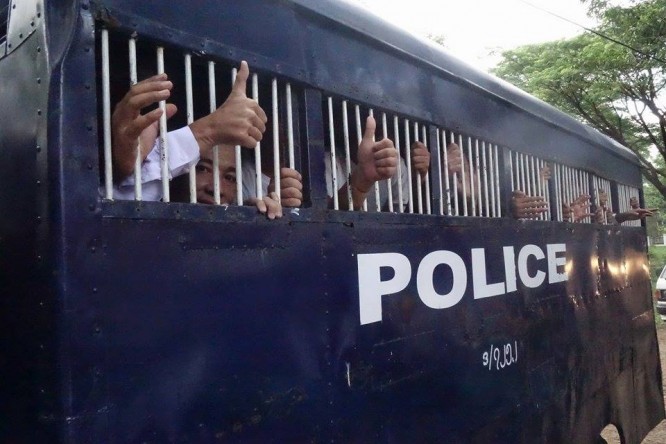Myat Thu has been on the run for about one year now. The 22-year-old student has slept in many different places, moves around in disguise and has not seen his family for all this time as President Thein Sein’s government considers him a threat.
“Sometimes I am OK, sometimes I am not with this mode of life,” he said during a furtive meeting in a teashop on Rangoon’s outskirts. He is wanted for his role in an education reform protest that ended with a crackdown at Letpadan on 10 March 2015, and the arrest of dozens of students.
Authorities have actively pursued him – like it has many other activists and students – into the final months and weeks of Thein Sein’s term, much to the anger of student organisations, human rights groups and families of the detained.
They now hope that the incoming National League for Democracy (NLD) government will release these and scores of other political prisoners put behind bars during the quasi-civilian government’s transitional rule.
“The government keeps issuing arrest warrants for individuals on charges of unauthorised demonstrations that took place several months ago or longer, while adding further charges for those already in custody,” said Aung Myo Kyaw, a spokesperson with Association of Assistance for Political Prisoners (AAPP) in Burma.
Since the 8 November elections, which Thein Sein’s Union Solidarity and Development Party (USDP) lost to the NLD, his government has rounded up 31 people: four students, 20 land rights activists and seven other activists, according to AAPP. The total number of political prisoners, as defined by the Thailand-based group, now stands at 86, while 370 people are awaiting trial.
Most recently, on 26 February, a Mandalay court sentenced three Muslim and Hindu interfaith activists from the city to two years in prison with hard labor for illegally crossing the border in 2014. On 24 February, Nilar Thein, a member of the 88 Generation Peace and Open Society, was arrested for participating in an unauthorised protest in Rangoon in March 2015.
An army-run home affairs ministry
Aung Myo Kyaw said releasing these prisoners will be a key responsibility of the NLD government and a possible point of contention with the Ministry of Home Affairs, which the army controls in accordance with the 2008 Constitution.
“The military chief and the Home Affairs Minister play crucial roles for the release of these prisoners. The upcoming NLD government will have to address this problem during its term and work with them to solve it,” he said.
Win Htein, an NLD spokesperson, told Myanmar Now that the new government would secure the prisoners’ release, but he added, “I cannot disclose that plan now because it will create a mess if I do that at this stage.”
Khin San Hlaing, an NLD lower house MP, criticised Thein Sein’s government over its continued arrests of students and activists. He said the NLD would amend draconian laws used against activists and release those detained, though he added that securing their release would depend on the army’s cooperation.
“We will have to wait and see how NLD will seek approval of the Home Affairs Ministry to release these political detainees. These problems could be solved through collaboration among all the government bodies,” he said.
Repression until the end
Thein Sein’s government took office in 2011 after decades of army rule and released hundreds of political prisoners as part of sweeping democratic reforms. But during the course of his term their numbers began to rise again, leading to criticism from local and international rights groups and the international community.
Old targets such as student leaders and human rights activists began filling prisons, as well as a new groups such as community activists who protest against the rising number of land disputes in Burma.
Most were held for holding an unauthorised protest under the Peaceful Assembly Law’s Article 18 and under vaguely defined junta-era charges such as the Penal Code’s Article 505 (b), which prohibits spreading statements that cause alarm or induce others to commit an offence against the state.
The outgoing government has also been criticised over its treatment of the detained, with some of the 77 students held following the Letpadan crackdown suffering from illness due to an alleged lack of healthcare, while their lawyers claim court proceedings have been delayed by authorities.
Home Affairs Minister Lieutenant-General Ko Ko told parliament on 5 February, however, that the detained students received adequate treatment and that an amnesty for them was out of the question.
Kyaw Min Yu, also known as Jimmy, husband of Nilar Thein and an 88 Generation Students leader, said the outgoing USDP administration was undermining its own legacy through the spate of recent arrests and harsh treatment of prisoners.
“This government will certainly be remembered with notoriety for its arrests of activists just before transferring power to the next government,” he said. “The NLD government can address these problems. So, the present government is writing its own history.”
[related]
Tin Oh, mother of fugitive Myat Thu, said authorities had been wrong to hunt for her son and treat the reform-seeking students as criminals.
“Students worked for the welfare of the whole country. They are not gangsters. We expect the next government will release them,” she said, adding, “I just want to see my only son at home, we are worried about his living conditions.”
This article was republished from Myanmar Now.



